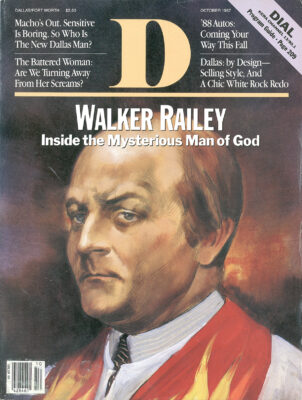Texans go to the polls on November 3 to answer a thorny question: should parimutuel betting be legalized? State Comptroller Bob Bullock says gambling on horse racing could add $25.6 million in muchneeded revenue to the state coffers in its first year. Proponents hail parimutuel betting as a new solution to our state’s financial woes; critics see legalized gambling as a new threat to the social and moral fiber. Actually, however, there’s little new about the debate: parimutuel betting is an idea whose time has come to Texas before-fifty years ago, to be exact.
Since 1937, Texans have rejected the parimutuel question a dozen times. Every time, the nays have carried the day. Back in the early Thirties, horse racing and parimutuel betting were seized upon (déjà vu) as a partial cure for states staggering under the weight of the Depression. Texas followed suit in 1933, but horse racing’s reign was short. During the next four years the state took in millions in taxes from parimutuel wagers, but that failed to impress the next governor, James Allred, who had campaigned on a promise to “rid Texas of the vile practice of betting on horse racing.” With strong support from the churches, Allred prevailed. In 1937, Texas became the only state in the nation ever to rescind parimutuel betting. And that’s where the matter has stood for fifty years, despite some pretty novel attempts to bring back exactas and daily doubles. In the late Sixties, a pro-racing state senator, E.V. “Red” Berry, went so far as to suggest splitting Texas into two states-South and North. He was sure that South Texas would embrace parimutuel betting, as various referenda had shown strong support for racing in southern counties.
Opponents of the referendum, which would also legalize betting on dog races, have arguments both moral and economic to buttress their case. Dick Stanford of Texans Who Care, a political action committee formed to work against the referendum, declares that “it’s a sham that parimutuel gambling is going to be good for economic development. It’s an empty promise.” The group, which lists Cowboys coach Tom Landry, State Sen. John Leedom, and motivational guru Zig ZigJar on its steering committee, believes that horse racing will prove a magnet to crime and they doubt that the industry will be able to police itself. The group also objects on the grounds of animal cruelty, citing the live rabbits used to train racing dogs and the possibility that drugged horses, driven beyond their endurance, will injure themselves.
Naturally, supporters of parimutuel betting deny all these allegations. R.H. Shepherd of Denton, a breeder of thoroughbred horses, belongs to the Texas Horse Racing Association, a group backing the referendum. Shepherd says he has polling data that show that 62 percent to 65 percent of Texans approve of playing the horses, but he is not complacent about the November 3 vote. He says the pro-pony faction will spend almost $1 million on a telephone campaign to educate voters about the referendum and identify supporters.
Horse racing in Texas would create “many thousands of jobs,” Shepherd says, while generating a cash flow of $1.2 billion to $2 billion a year, “depending on whose estimates you look at.”
As for the moral issues, Shepherd points out that he is an elder in the Presbyterian Church. “I’m a Christian, but I don’t believe it’s a sin to watch horses race or to put two dollars on a horse at the window,” he says. “People gamble on the stock market every day and no one calls that a sin.” And Shepherd is not swayed by the ministers and law enforcement of-ficials who argue that race tracks draw criminals like stables draw flies. “Horse racing is the most policed sport in the world,” he says. “Everyone involved-owners, trainers, jockeys, grooms, backstretch employees-is checked for felony convictions. Every horse that wins a race is tested for drugs. Racing is cleaner and better policed than professional football,” Shepherd says. “And how many millions are bet on Cowboys games every weekend?”
As the parimutuel opponents jockey for position, it’s clear that both think they’ve got a winner. Of course, that’s what makes a horse race.
Get our weekly recap
Brings new meaning to the phrase Sunday Funday. No spam, ever.
Related Articles

Arts & Entertainment
DIFF Documentary City of Hate Reframes JFK’s Assassination Alongside Modern Dallas
Documentarian Quin Mathews revisited the topic in the wake of a number of tragedies that shared North Texas as their center.
By Austin Zook

Business
How Plug and Play in Frisco and McKinney Is Connecting DFW to a Global Innovation Circuit
The global innovation platform headquartered in Silicon Valley has launched accelerator programs in North Texas focused on sports tech, fintech and AI.

Arts & Entertainment
‘The Trouble is You Think You Have Time’: Paul Levatino on Bastards of Soul
A Q&A with the music-industry veteran and first-time feature director about his new documentary and the loss of a friend.
By Zac Crain


